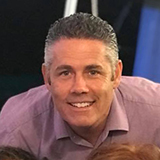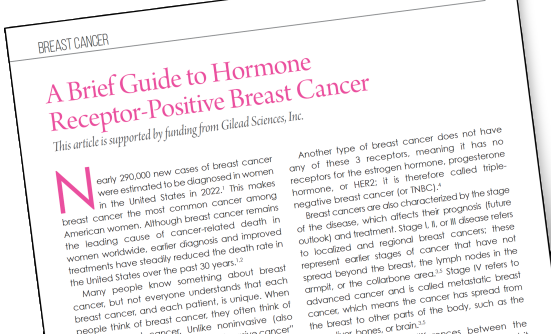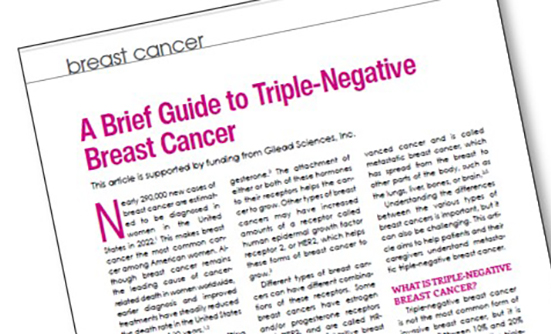Ryan Callahan had been living in Texas helping to run a restaurant when he got a call from his mom, Missi, which changed everything. Callahan had been keeping up to date with his mom, who had been living in Colorado, while she was going through cancer tests. During this phone call, his mom revealed that the diagnosis was thought to be a less severe form of ductal carcinoma in situ (DCIS) breast cancer. After Callahan got off the phone, he spoke to his wife, Jessie, and shortly thereafter they decided to move to Colorado to take care of his mom.
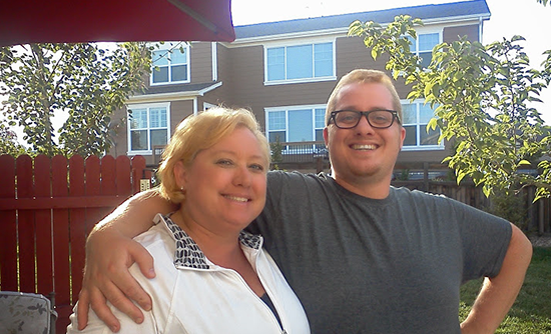
The treatment prescribed for Missi was a relatively simple, single lumpectomy. However, during the procedure, the surgeon found larger-than-anticipated growths in her breast, additional growths in her other breast, and they ended up having to do a single full mastectomy and a lumpectomy.
After the removed tissue was biopsied, it was found she had human epidermal growth factor receptor 2 (HER2)-positive breast cancer. This is a more severe form of cancer that would also require chemo treatments.
When his mom began chemo, Callahan noticed her diminished appetite because she was experiencing a metallic taste with food. Callahan was fully aware of this side effect because a friend and both of his grandfathers had battled cancer.
Along with patients suffering nausea and mouth sores, the metallic taste can exacerbate a diminished desire to eat. Because Callahan found this to be unacceptable, especially during a time when cancer patients need to have as much strength as possible, he went to work to address this issue.
As a Western- and Eastern-style trained chef, Callahan began experimenting with different foods and flavors to get his mom to enjoy eating again. A discovery in his approach to cooking and feeding his mom gave him the eureka moment that allowed him to find that he could help his mom and others going through chemo.
This led to the eventual development of his cookbook, Cooking for Chemo…and After! Callahan explains that his book provides cancer patients with options for different foods depending on where they are in their treatment.
Callahan makes a point to bring up the fact that cancer treatment can bring up additional health issues. For example, Missi had to have a hysterectomy due to ovarian cysts which were a side effect of the chemo.
CONQUER recently sat down with Callahan, and he talked about how he discovered how to help his mom overcome the metallic taste with his “roundness of flavor” concept, the development of his cookbook, his own battles with anxiety, and how his mom is doing today.
CONQUER: You had been talking to your mom via phone about the cancer tests she was going through to diagnose her. Can you talk about the conversation when you found out your mom had breast cancer?
Callahan: Our family is very open about health issues, so I was kept informed the whole time. For example, she said something along the lines of: ‘Hey Ryan, I got a mammogram and something came up abnormal.’ Then she told me about the follow-up appointments with the oncologists. It progressed slowly from this tiny little bump into we are now going to schedule surgery.
CONQUER: What made you decide to move from where you were living (Texas), and move to Colorado to be with your mom?
Callahan: It was a multifaceted decision. It was a gut feeling that this cancer is something bigger. The reason I felt that was my previous experience with cancer. My two grandfathers and a friend of mine from college died from cancer. When I heard the “C” word, I thought it was chemotherapy and then death. It was my first inclination that I had to go help her because there was no one else there.
Second, we were in Texas helping family friends run a restaurant, and they were having health problems as well. So, my wife, Jessie, and I decided that we needed to make the call to close down the restaurant. Between everyone’s health issues, we needed to focus on people’s health.
CONQUER: It must have been a difficult decision to close the restaurant after pouring blood, sweat, and tears into it?
Callahan: It was a difficult decision; we had been working 16-hour days for about a year.
CONQUER: As your mom was going through chemo, she developed a side effect involving food and that everything she ate had a metallic taste to it. Was it this metallic taste she was experiencing that led you to developing recipes for your mom?
Callahan: Both my grandfathers and my best friend in college went through chemo, so I was familiar with the metallic taste people suffered.
As my mom went through chemo, I kept a journal. The journal became my tasting guide. It wasn’t about focusing 100% on the metallic taste or combating that, it was about getting my mom to eat in general. The recipes came about naturally. My mom might say that she wanted a grilled cheese sandwich. I would give it to her and ask her how it tasted. If it was too salty? Too sweet? Too savory? We worked together. I was lucky in the fact that I got to be her live-in caregiver, and I cooked every meal for her. I got to test every single meal. It was my culinary theory, the roundness of flavor, and palate cleansing that changed the game and could be applied to every meal.
And the roundness-of-flavor techniques I used in my book can be applied to any type of food.
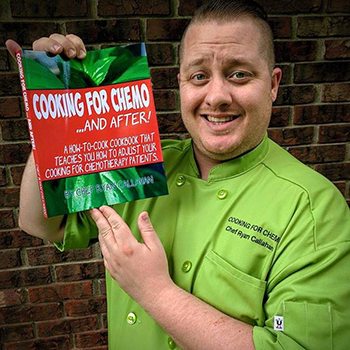
CONQUER: How did you decide to develop your book, Cooking for Chemo...and After!?
Callahan: Whenever I cook I make notes. The book started as these tasting notes from the journal. In this aspect, it was cooking for my mom, and I knew she was going to start to go through these side effects.
After she ate something, I would write down how she felt about it. The recipes she liked, I started writing down. One day I had this realization that adding vinegar to the dishes allowed my mom to go back and have a second or third helping of a dish; it was a huge accomplishment! It was a eureka moment. That moment turned into calling around to the different cancer organizations in Colorado to see if there was anything like this. I was convinced that this was a new concept. I felt that the only way to get people to understand this was to do hands-on cooking classes. I wrote a 20-page pamphlet with recipes and I gave it to people attending my cooking classes.
This morphed into something bigger. My wife convinced me to start from scratch. My first manuscript was focused on the culinary professional. She told me that everyone should get a copy of the book, and to instead focus on patients and caregivers. It became a goal of mine to build an army of chefs to combat the side effects of chemotherapy because if you don’t eat, you die. If you can manage these side effects and get people to eat, we can increase survivorship rates. That was the goal and focus of the book and that is how it came to be.
CONQUER: In your book, you talk about the roundness of flavor. Can you explain this concept?
Callahan: It is the idea that your senses go into the experience of eating. The two main senses associated with eating are the tongue, which tastes salty, savory, sour, and sweet; and the nose, which is a larger percentage of the overall experience.
One of the issues with chemo is that it breaks down your sense of smell. The roundness of flavor teaches you to bring the sense of smell that has been brought out of balance to first adjust to the flavor changes and increase it through one of the other senses. For example, the trick I used was I always sautéed garlic. My mom’s room was upstairs so I taught her through association with her sense of smell that it was time to eat.
Roundness is taking everything as a whole, adjusting to the changes like chemo, and implementing things to overcome that in your cooking.
CONQUER: In your book, you cover everything from breakfast to dinner to snacks. Why the decision to do so?
Callahan: I wanted to focus on chemotherapy side effects. The beginning of the recipes section focuses on heavier weighted items you can eat at the start of chemo. Whereas, the back of the recipes section contains lighter recipes that are good when people are suffering stronger chemo side effects. As you transition from the how-to sections of the book to the recipes, you can see I altered the conventional recipes to both, and make the flavors stronger to adjust for the chemotherapy changes.
I wanted everyone to have options. When you go through chemo, you need to have several small meals throughout the day.
Usually after your fourth round of chemo, your side effects really kick in. That’s why we have the soups and the smoothies, so you can still get a really good meal even if you are dealing with mouth sores, for example.
I also wanted to give caregivers meals to make or warm up. As a caregiver, having various small meals ready to go was a big help, so my mom could make the decision about what to eat, based on how she felt.
CONQUER: You have a background as a chef. Can you talk about your experience in cooking?
Callahan: I started working in a restaurant when I was 15 years old and I’m now 30. I have worked every job from busboy to dishwasher to prep cook to chef to general manager. I also went to culinary school. However, my biggest strength comes from a lesson my grandma taught me: ‘The purpose of education is to teach you how to do it yourself.’ I have the ability to self-educate. I get up every day and try to learn something new in cooking. With the Internet you can go online and learn techniques and other culinary-related things.
I have also found mentors along the way. I am Western-trained in French and Italian cooking, and Eastern in Chinese. What I learned is that Western cooking has half the bubble and that Eastern has the other half. It is only in uniting both culinary styles you understand the origins of flavor, and how you can combine them to enhance meals.
CONQUER: One of the important aspects in your story is the fact you moved to Colorado to care for and be there for your mom. How would you characterize how it felt to be a caregiver to her?
Callahan: Being a caregiver is the single hardest thing I had to do in my entire life. You have to go from seeing someone you love being healthy to sick to rehabilitating, and then hoping to see them get better. It is a lot like going to war, especially on an emotional level. You go in with these expectations that you are doing something great in helping that person, but by the time you get in there and things start flying around, you say to yourself, ‘How did I get here?’
On the other side of that, being a caregiver is exceptionally rewarding because you get to hold that person’s hand and walk them through the steps. They put an enormous amount of trust in you. It is very trying. I naturally have a social anxiety. I didn’t have any social contact with people for about a year because I was taking care of my mom. Whenever I had to go shopping, my anxiety would arise because I wasn’t around other people at all. It peaked during my mom’s chemo treatments when I would go to a store and I might have a panic attack because there are several people near me. You have to make sure as a caregiver you take care of yourself.
CONQUER: How is your mom doing today?
Callahan: My mom is doing well; she is taking everything one day at a time.
With breast cancer it can be more treatable than some other cancers, but one of the things they don’t tell you is there are a lot of associative diseases and long-term side effects that come from breast cancer treatment and going through the healing.
Cancer is a struggle of the mind and the body. A lot of patients including my mom struggle with survivor guilt and experience depression as a result.
She is back doing pharmaceutical research, which is what she does for a living. She is living close to me, and overall she is happy.
CONQUER: What have you learned through this experience?
Callahan: This may be a cliché, but the number one thing I learned is you have to take it one day at a time. You have to be happy with the small successes in life because you don’t know when something bad is going to happen or your life gets derailed. I’m an entrepreneur and I’m guilty of this. I’m focused on that next business and that next goal. What I had to learn with cancer is you can’t think that way. You have to focus on your family, your relationships, and just being happy.
Also cancer doesn’t just affect you physically; it also takes an extreme mental toll on people and their relationships. It really shines a spotlight on all your personal shortcomings and your relationships. Mental health needs to be taken very seriously. They call it survivor guilt; I believe it is a form of posttraumatic stress disorder. You survive and feel badly, and both the medical community and cancer survivors need to consider this aspect of care.
I also learned that no matter how bad the situation, you can take any negative and turn it into a positive. Although my mom was going through cancer, I found a way to turn this around and create a positive thing that hopefully can help cancer patients eat again.
To learn more about Callahan’s book, Cooking for Chemo...and After!, or to purchase it, go here.





